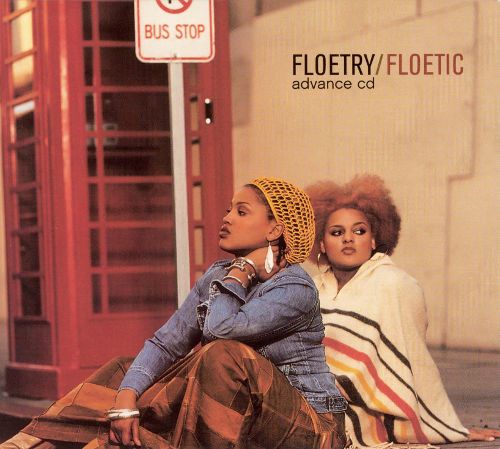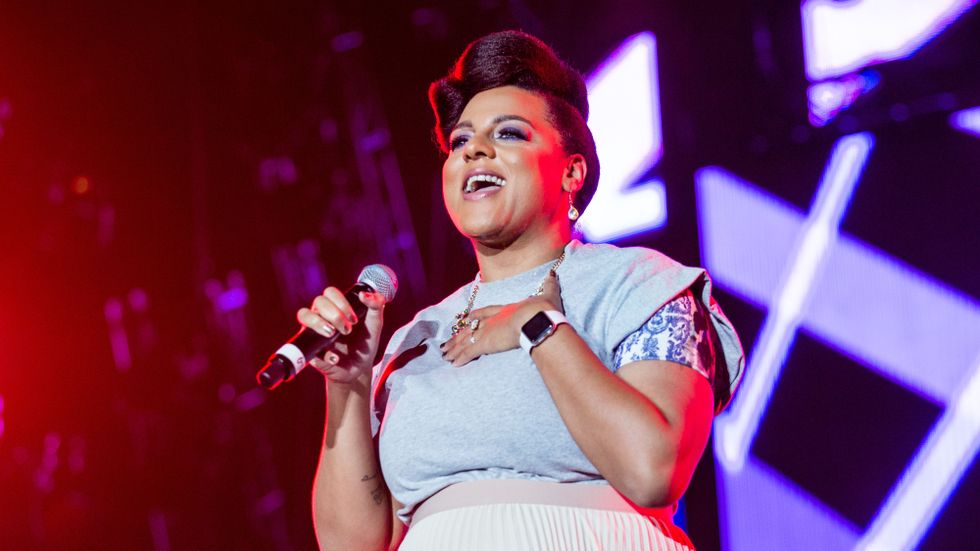Breaking out on the music scene as part of the soulful duo Floetry in 2001, Marsha Ambrosius wasn’t trying to develop her passion because she knew it was already there. Joining forces with high school friend Natalie Stewart, known as the The Floacist, to add her poetry for a song she penned and submitted to her publishers.
 “For me, I’ve always written songs, I’ve always produced. I had this magical and remarkable idea lending this poetry to my work. I called the Floacist and said, ‘I want you to put some poetry to a song I had, ‘Fantasize’. We did, and we performed it. It took a life form of its own. It was no development; the development was letting people see it and experience it,” she said. “I feel that’s why it was such a powerful connection as two very young, Black women standing there speaking truth. Grown woman stuff that we shouldn’t be even saying. Those songs that I wrote—wow! Back then, the perspective I had as a 22-year old is nothing like what the 22-year olds are talking about right now.”
“For me, I’ve always written songs, I’ve always produced. I had this magical and remarkable idea lending this poetry to my work. I called the Floacist and said, ‘I want you to put some poetry to a song I had, ‘Fantasize’. We did, and we performed it. It took a life form of its own. It was no development; the development was letting people see it and experience it,” she said. “I feel that’s why it was such a powerful connection as two very young, Black women standing there speaking truth. Grown woman stuff that we shouldn’t be even saying. Those songs that I wrote—wow! Back then, the perspective I had as a 22-year old is nothing like what the 22-year olds are talking about right now.”
Ambrosius’ unique sound and songwriting skills led her to writing the hit song “Butterflies” for Michael Jackson for his “Invincible” in 2001. Relocating to Philadelphia, both Ambrosius and Stewart would eventually land a record label contract with DreamWorks where they would produce two full lengths: “Floetic” and “Flo’Ology” and a live album, “Floacism.” Hit songs from “Floetic,” “Say Yes” and “Getting Late,” would create a successful and refreshing movement of Neo Soul and Spoken Word while carving Ambrosius a place among then-break out artist Jill Scott.
She would embark on a solo career in 2009, releasing her debut album “Late Nights & Early Mornings” released on J Records. “Friends and Lovers” would follow along with several collaborations including features with Busta Rhymes, Ne-Yo, Common, Wale, Talib Kweli, Daley, The Robert Glasper Experiment and many others.
 Her musical style and diversity in collaborative projects stems back to her hometown in London.
Her musical style and diversity in collaborative projects stems back to her hometown in London.
“Growing up in Liverpool, I’ve had the luxury of listening to everything including the Beatles. But they were hometown heroes. Even though it was Beatlemania to the rest of the world, they were just kids from up the street. My grandmother used to babysit Ringo, had his drumsticks still in the house. It was local for us,” she said. “So, my influence was listening to my mother’s extensive vinyl collection which ranged from Larry Graham, Grand Central Station to Stevie Dan, Duran Duran, Queen, Marvin Gaye, Prince, Michael Jackson—your regular Soul and Funkadelic stuff.”
As her repertoire of music grew so did her admiration for female vocalists such as Patrice Rushen and Teena Marie; tapping into her mother’s extensive musical library, I was just open. She said it was a magical time for music.
“That was the UK during the 1970s and 1980s, we were unafraid to say something was borrowed or lent or influenced because we were a melting pot of all of these different cultures. Growing up being Black in Britain, I think that was a strong and significant time then as it is today,” she said.
The impact of American Black music in the UK is not a secret having music legends such as The Beatles, The Rolling Stones and others pay homage to its creators—hearing it throughout their own catalog today. Another wave of British creators has taken flight from the Soul music scene, flipping the script in the States. But, Ambrosius feel although White artists are influenced by the genre, there will always be a distinct difference in styles.
“I think it’s the same now. It’s why Adele can be Adele and Jasmine Sullivan can be Jasmine Sullivan. When I grew up, I didn’t see color in the music. Not through music, I understood in life. In music, it was good, or it was bad. I just loved good songs. That could be anything from a soft rock ballad like The Journey, The Eagles or Please Don’t Go by Chicago or EWF’s Reasons. It wasn’t Black or White—it was music.”
She explains, “I feel like even today, you just have to know if it’s what’s good or bad. The whole Black and White thing comes into it when there’s these fine lines where things are borrowed but not acknowledged. Back then, we used to acknowledge its creators. Now, it’s they’re getting away with the most—whatever that is.”

As she prepares for her fifth studio album, titled NYLA, she’s excited to share her next project and preparing for touring in early 2018. A wife and new mother of a little girl, she’s taking it all in stride as she launches a new chapter in her life. She remembers to listen to the words of wisdom from her mother regarding maternal instincts and the musical bond she shares with her father when they compare old and new songs.
Although Ambrosius has lived in the U.S. for a great deal of her professional musical career, the kid from the working-class community of South London continues to cultivate her craft as a vocalist and songwriter.
“I continue to work hard. I continue to work on me. I don’t take anything for granted. Nothing is for certain. I allow myself to be open to new challenges and new things. I feel my signature stamp happens because I refuse to not acknowledge who it is when it happens. ‘Oh, yeah that’s Marsha.’ Only me and no one else,” she said. “That is rare. I never marked myself as an exceptional singer but I’m exceptional at these harmonies, these transitions, these weird inflections, the sync strings sound that I would make. That’s what I decided to master, that’s what I concentrate on. I wanted to mimic being an instrument. When I play me, it’s me.”
Follow Mary L. Datcher on Twitter
